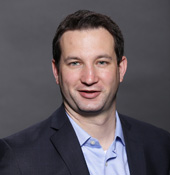Since his days growing up in Silicon Valley, Daniel Fabbri, assistant professor of biomedical informatics and computer science in the School of Medicine and School of Engineering, respectively, has always been driven to use his academic knowledge to make an impact. “I never wanted to write papers that sit on the shelf,” he said. “What drives me is to innovate and actually make an impact on people’s lives and influence change.”

Fabbri earned his Ph.D. from the University of Michigan, Ann Arbor, where he developed innovative technologies in database systems and machine learning when applied to electronic medical records and clinical data. Building on his work in Michigan, Fabbri received a National Science Foundation Innovation Corps award to accelerate translating his new technologies from the lab to commercialization. In the process, he founded the technology startup Maize Analytics in 2013, with its early offices at the Nashville Entrepreneurship Center. Over the next years, Fabbri and team grew the employee base, added to the customer base and raised capital from Nashville investors.
“What drives me is to innovate and actually make an impact on people’s lives and influence change.”
In May 2021, Maize Analytics, Fabbri’s company that ensures electronic health record compliance and security, was acquired by SecureLink, an Austin, Texas-based company providing health care IT services to more than 1,000 U.S.-based hospitals. By the time Maize Analytics was acquired, it had grown to employ more than 35 people (including Vanderbilt alumni), earned the title of top patient privacy monitoring solution by industry research and insights firm KLAS in 2021, and had customers across North America—including some of the largest academic and for-profit health systems.
Fabbri credits his and the company’s success, in part, to lessons learned from the Vanderbilt innovation ecosystem. “The Wond’ry and other Vanderbilt resources provide fantastic opportunities to learn from other entrepreneurs and share stories,” he said. “Vanderbilt is the right size for innovation: It has a range of world-class expertise in one place but is not too large to where your asks are ignored.”
This innovative and collaborative environment has wound through Fabbri’s years at Vanderbilt, particularly as he served as lead investigator for multi-department research projects sponsored by the National Institutes of Health, National Science Foundation and U.S. Department of Defense.
“Daniel’s commitment to bringing his idea to life was an inspiration to his colleagues at the Wond’ry,” said David Owens, Evans Family Executive Director of the Wond’ry and professor of the practice of management and innovation at the Owen Graduate School of Management. “We have been very proud, but not the least bit surprised, of his success and see his work as a beacon for other Vanderbilt students, faculty and staff looking to channel their innovative ideas to solve some of the world’s biggest challenges.” The two were part of VU bioinformatics team studying electronic medical record usability by physicians.
Fabbri is committed to remaining at Vanderbilt as a professor and mentor to other entrepreneurs, though his current role is part-time, while he continues to drive the Maize vision forward and lead data initiatives as the Chief Data Scientist of SecureLink.
“With Maize, I have learned lessons that can be used as a roadmap for future researchers to leverage as they design, build and possibly commercialize projects,” Fabbri said.